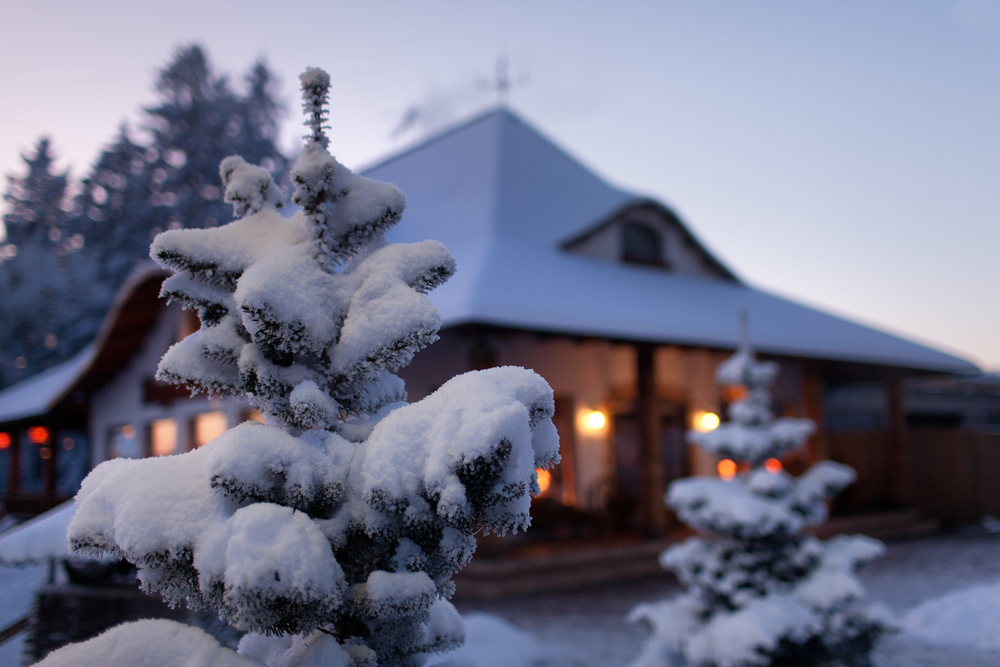Winters in Ontario are very unpredictable. The combination of snowfall, ice, rain and wind can be extremely dangerous and can wreak havoc on your home and property. While there is much about the winter season that we can’t plan for there are many steps you can take to protect your homes from winter damage.
Roof
Your roof is a prime spot for snow and ice to build up. As more and more snow falls the weight can add up and become too heavy for your roof to handle. If left alone, the added weight can cause damage to not only your roof, but your shingles, gutters and the structure of your home.
For most home owners, gravity will lend a helping hand. Ensuring your eaves troughs are free of any debris before the winter weather strikes can help avoid ice damning and leaks into your home! If your roof is flat or has a low pitch, you may need to intervene by having a professional roof cleaning service handle and assess any potential damage.
The earlier you address any possible concerns the more likely you will be to avoid serious damage to your home.
Frozen Pipes & Hoses
Water damage continues to be a major cause of damage to homes across Ontario each winter. Ensuring that your outside pipe connections are drained and winterized can help prevent a costly claim in your home throughout the winter months. Here are a few steps you can take to help prevent your pipes from freezing, bursting and causing major damage.
- Walk around the outside of your property and disconnect any hoses
- Go inside, locate your shut off valve and turn it clockwise (right) to close.
- Turn the water off, go back outside and open the faucet until the water has completely drained.
- Go inside, get a bucket and towel, and unscrew the bleed valve until the rest of the water has drained out.
- Repeat for any additional outdoor taps
Other steps you can take to prevent frozen pipes include:
- Add external insulation to pipes
- Let your faucets run frequently
- Keep your home heated to at least 55 degrees Fahrenheit (13°C)
Water Shut-Off Valve
Even if you don’t have any outdoor connections to winterize, knowing where your water shut-off valve is can help mitigate some damage. If a pipe freezes and bursts, the sooner your water is turned off, the more damage you can help prevent!
Furnace
Make sure your furnace is in great working order before the freezing temperatures arrive! In the middle of a snowstorm the last thing you want is to be waiting in the cold for any repairs.
- Make sure your furnace filter is replaced
- When you first turn your unit on listen for any unusual banging or rattling sounds
- Make sure that all external pipes are free from any obstructions (these should be checked after every snowfall as well)
- Make sure you are changing your furnace filter every one to three months
- Hire a qualified service technician for yearly preventative maintenance
Wood Burning Appliances
Many homes enjoy the warmth and comfort of a wood burning appliance throughout the winter months. As wonderful as these appliances are they require proper installation and regular maintenance to keep you, your family and home safe.
There are many steps you can take to ensure you can continue enjoying any wood burning appliance year after year.
- Inspect your wood burning stove properly
- Use seasoned wood
- Clean the ashes regularly
- Properly clean the chimney and stove pipe
- Follow proper fire starting techniques
Electric Space Heaters
An electric space heater can be a great way to quickly heat up any room in your home. There are many ways to ensure that you can use them safely and effectively each year.
- Place space heaters at least 3 feet away from any walls, furniture, curtains or other flammable items
- Keep them away from any sources of moisture
- NEVER leave them on unattended or overnight
- Make sure they are plugged directly into an outlet, NOT an extension cord
- Choose a model that has increased safety features including:
- Automatic Shut Off or Tip Over Protection
- Overheating Sensors
- Canadian Safety Association (CSA) Certification
Additional Precautions:
- Ensure your outside vents are cleared from any debris, snow and ice. Blocked vents can lead to carbon monoxide build up in your home which is extremely dangerous
- Keep your sidewalk, driveway and front steps clear of any snow and ice to prevent any injuries from occurring
- When temperatures begin to rise keep an eye out for any localized flooding outside that could make it’s way into the foundation and your basement


